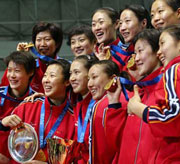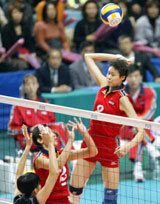|
 Chinese
head coach Chen Zhonghe and his women spikers love to sing a popular
lyric titled as "Sunlight always comes after wind and rain". Chinese
head coach Chen Zhonghe and his women spikers love to sing a popular
lyric titled as "Sunlight always comes after wind and rain".
"Sunlight always comes after wind and rain, be confident
that we will see the rainbow in the end. No matter how much wind
and rain we go through, I will always be on your side," Chen
sang softly the mandarin song in
a Fujian accent after China won the first triumph at the three major
women's volleyball tournaments, namely the World Cup, the World
Championships and the Olympics, since 1986, when China crowned at
the World Championships.
"My players have been my companions through the rain and
wind,"Chen said. "I could not achieve anything without
them."
When the 46-year-old Chen, who had been trial
horse and assistant coach of the Chinese women's team since
1979, took the helm in February,
2001, few people believed he could lead the team to repeat the glory
of the "Old Chinese Women's Volleyball Team", which had
scored five straight victories in the World Cup, the World Championships
and the Olympics in the 1980s.
"I was not a famous coach, and I had not made significant
achievements as a player," Chen said.
"Quite a few people doubted my ability, some even said 'Is
that possible that somebody who can not even speak standard mandarin
can be a good coach?'" Chen recalled.
The critics raised their high-pitched
tones when Chen began to rebuild the Chinese team by replacing star
players such as Zhu Yunying and Qiu Aihua with newcomers Feng Kun,
Yang Hao, Zhao Ruirui and Liu Ya'nan.
Against heavy pressure as his move was hotly disputed across the
Chinese media, Chen did not back off
but sticked to his choice of players and the young spikers
did not let him down.
 The
fresh faces began to make their international fame late in 2001.
Following a victory in the Asian Championship,
China won the Grand Champions Cup
with a crystal clean record in Japan
in November. The
fresh faces began to make their international fame late in 2001.
Following a victory in the Asian Championship,
China won the Grand Champions Cup
with a crystal clean record in Japan
in November.
The Chinese women went on to finish runners-up to Russia at the2002
Grand Prix finals, before trapping
into the biggest trouble since the founding of the new squad.
In a strategy to avoid an early crash with Russia, which held
a commanding record over China in 2002, at the World Championships
in Germany, China lost some of the group matches intentionally,
triggering off anger from the opponents as well as the Chinese fans.
The low-spirited Chinese women then lost to Italy in the semi-finals
for a disappointing fourth place finish at the tournament.
"That was the worst time for our team," said Chen Zhonghe.
"Fortunately we went through it shoulder
to shoulder."
China lucked up going into the year of 2003. It scored its first
ever Grand Prix title in Italy in August and retained the Asian
championship title in Vietnam in October before completing a 2003
hat-trick at the World Cup.
With the World Cup trophy and an Olympic ticket in hand, Chen
and his players eyed the title at
the Athens Games in 2004.
"People will have higher expectations from us in the Olympic
Games, because we have won the World Cup," said Chen. "But
we still have a lot to improve in order to achieve a good result
at the Athens Games."
"We will come across more difficulties and obstacles in the
future, but I'm sure we shall overcome them together."
|
